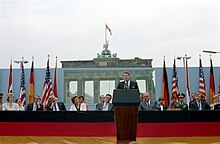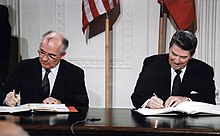User talk:Happyme22/Sandbox/Archive 3
Sandbox item 1
[edit]The significance of Reagan's role in ending the Cold War has spurned contentious and opinionated debate.[1][2] That Reagan had some role in accelerating the downfall of the Soviet Union is collectively agreed, but the extent of this role is undefineable, and therefore primarily opinion. It was Reagan's policies of peace through strength, hard line rhetoric against the Soviet Union and Communism, as well as summits with General Secretary Gorbachev that played his part in ending the War.[3][4] He stood out among post-World War II presidents as being one with a view that the Soviet Union could be defeated rather than simply negotiated with,[3] but his strong rhetoric toward the nation had mixed effects; Jeffery W. Knopf, Ph.D. observes that being labeled "evil" probably made no difference to the Soviets but gave encouragement to the East-European citizens opposed to communism.[3] It is also argued that Reagan had little or no effect on the end of the Cold War; that communism's internal weakness had become so apparent, and the Soviet Union would have collapsed in the end regardless of whom was in power.[3] President Harry Truman's policy of containment is also regarded as a force behind the fall of communism, and the Soviet invasion of Afghanistan undermined the Soviet system itself.[2]
General Secretary Gorbachev said of his former rival's Cold War role: "[he was] a man who was instrumental in bringing about the end of the Cold War,"[5] but labeled him as "a hawk" in the 1980s.[5] Gorbachev does not acknowledge a win or loss in the war, but rather a peaceful end; he said he was not intimidated by Reagan's harsh rhetoric.[6] Margaret Thatcher, former Prime Minister of the United Kingdom, said of Reagan, "he warned that the Soviet Union had an insatiable drive for military power... but he also sensed it was being eaten away by systemic failures impossible to reform."[7] She also stated, "Ronald Reagan had a higher claim than any other leader to have won the Cold War for liberty and he did it without a shot being fired."[8] Said Brian Mulroney, former Prime Minister of Canada: "He enters history as a strong and dramatic player [in the Cold War]."[9]
Footnotes
[edit]- ^ D'Souza, Dinesh (June 6, 2004). "Russian Revolution". National Review. Retrieved 2008-01-06.
{{cite web}}: Check date values in:|date=(help) - ^ a b Chapman, Roger (June 14, 2004). "Reagan's Role in Ending the Cold War Is Being Exaggerated". George Mason University. Retrieved 2008-01-06.
{{cite web}}: Check date values in:|date=(help); Unknown parameter|accssdate=ignored (help) - ^ a b c d Knopf, Jeffery W., Ph.D. (August 2004). "Did Reagan Win the Cold War?". Strategic Insights. III (8). Center for Contemproary Conflict. Retrieved 2008-01-06.
{{cite journal}}: CS1 maint: multiple names: authors list (link) - ^ Meacham, John (June 14, 2004). "American Dreamer". Newsweek.
{{cite news}}:|access-date=requires|url=(help); Check date values in:|date=(help); Unknown parameter|coauthors=ignored (|author=suggested) (help) - ^ a b Heintz, Jim (June 7, 2004). "Gorbachev mourns loss of honest rival" (Reprint). Associated Press. Oakland Tribune. Retrieved 2008-01-06.
{{cite news}}: Check date values in:|date=(help); Italic or bold markup not allowed in:|publisher=(help) - ^ Kaiser, Robert G. (June 11, 2004). "Gorbachev: 'We All Lost Cold War'". The Washington Post. p. A01. Retrieved 2008-01-06.
{{cite news}}: Check date values in:|date=(help) - ^ "Full Text: Thatcher Eulogy to Reagan". BBC. June 11, 2004. Retrieved 2008-01-06.
{{cite news}}: Check date values in:|date=(help) - ^ "Reagan and Thatcher; political soul mates". MSNBC. June 5, 2004. Retrieved 2008-01-08.
{{cite news}}: Check date values in:|date=(help) - ^ Clayton, Ian (June 5, 2004). "America's Movie Star President". CBC. Retrieved 2008-01-06.
{{cite news}}: Check date values in:|date=(help)
Sandbox item 2
[edit]that's a POV argument if I've ever heard one: True, how the USSR collapsed is still being debated, and who held the largest role as well, but even the author of that WaPo article (the guy who showed his true colors by writing: "the blend of sentimentality, Cold War triumphalism and superficial news coverage that reflects the dangerous American habit of neglecting the world's complexity in favor of drawing a self-indulgent, solipsistic caricature of international affairs") says that Reagan had some role in the end of the cold war and fall of Communism. Happyme22 (talk) 17:50, 15 March 2008 (UTC)
Western diplomats agree that Gorbachev offered major concessions to the US because of his willingness to sign an agreement that would get rid of SDI while losing nuclear weapons. (http://query.nytimes.com/gst/fullpage.html?res=9B0DE5D81131F931A35750C0A961948260&sec=&spon=&pagewanted=all)
That agreement did not get rid of SDI. Furthermore, the "serious concession" the western diplomats were talking about is that the agreement "may revive prospects of further arms agreements, including his ultimate arms control ambition, an agreement limiting the Star Wars' program".--Miyokan (talk) 08:04, 16 March 2008 (UTC)
Please see Predictions of Soviet collapse and two books I commented about at talk page of Reagan article.Biophys (talk) 23:58, 16 March 2008 (UTC)
http://commdocs.house.gov/committees/bank/hba63463.000/hba63463_0.HTM
End of the Cold War
[edit]
By the early 1980s, Moscow had built up a military arsenal and army surpassing that of the United States. Previously, the US had relied on the qualitative superiority of its weapons to essentially frighten the Soviets, but the gap had been narrowed.[1] After President Reagan's military buildup, the Communist state did not further dramatically build up its military;[2] their enormous military expenses, in combination with colectivized agriculture and innefficient planned manufacturing, were a heavy burden for the Soviet economy. At the same time, the Reagan Administration persuaded Saudi Arabia to increase oil production,[3] which resulted in a three times drop of oil prices in 1985; oil was the main source of Soviet export revenues. These factors gradually brought the Soviet economy to a stagnant state during Gorbachev's tenure.[ref to book by Gaidar][147]
Ronald Reagan recognized the change in the direction of the Soviet leadership with Gorbachev, and shifted to diplomacy, with a view to encourage the Soviet Leader to go further with his reforms. Gorbachev agreed to meet Reagan in four summit conferences around the world: the first in Geneva, Switzerland, the second in Reykjavík, Iceland, the third held in Washington, D.C., along with the fourth summit in Moscow, Russia.[4] Reagan believed that if he could persuade the Soviets to allow for more democracy and free speech, this would lead to reform and the end of Communism.[5]
Speaking at the Berlin Wall, on June 12, 1987, Reagan challenged Gorbachev to go further:
| “ | General Secretary Gorbachev, if you seek peace, if you seek prosperity for the Soviet Union and Eastern Europe, if you seek liberalization: Come here to this gate! Mr. Gorbachev, open this gate! Mr. Gorbachev, tear down this wall! | ” |
Prior to Gorbachev visiting Washington, D.C. for the third summit in 1987, the Soviet Leader announced his willingness to go further with arms agreements.[6] The timing of the announcment led Western diplomats to state that Gorbachev was offering major concessions to the United States on the levels of conventional forces, nuclear weapons, and policy in Eastern Europe,Cite error: A <ref> tag is missing the closing </ref> (see the help page).

When Reagan visited Moscow for the fourth summit in 1988, he was viewed as a celebrity by Russians. A journalist asked the president if he still considered the Soviet Union the evil empire. "No," he replied, "I was talking about another time, another era."[7] At Gorbachev’s request, Reagan gave a speech on free markets at the Moscow State University.[8]
In his autobiography An American Life, Reagan expressed his optimism about the new direction that they charted, his warm feelings for Gorbachev, and his concern for Gorbachev's safety because he pushed reforms so hard: "I was concerned for his safety," Reagan wrote. "I've still worried about him. How hard and fast can he push reforms without risking his life?"[9] The Berlin Wall was torn down starting in 1989 and two years later the Soviet Union collapsed.
- ^ Hamm, Manfred R. (June 23, 1983). "New Evidence of Moscow's Military Threat". The Heritage Foundation. Retrieved 2007-05-13.
- ^ Barnathan, Joyce (June 21, 2004). "The Cowboy who Roped in Russia". Business Week. Retrieved 2008-03-17.]
- ^ Gaidar, Yegor. "Public Expectations and Trust towards the Government: Post-Revolution Stabilization and its Discontents". Retrieved 2008-03-15.
- ^ "Previous Reagan-Gorbachev Summits". The New York Times. May 29, 1988. Retrieved 2008-01-26.
- ^ "Modern History Sourcebook: Ronald Reagan: Evil Empire Speech, June 8, 1982". Fordham University. May 1998. Retrieved 2007-11-15.
- ^ Keller, Bill (March 2, 1987). "Gorbachev Offer 2: Other Arms Hints". The New York Times. Retrieved 2008-03-17.
- ^ Talbott, Strobe. (August 5, 1991). "The Summit Goodfellas". Time. Retrieved 2008-01-26.
- ^ Reagan, Ronald (1990), p. 713
- ^ Reagan, Ronald (1990), p. 720
